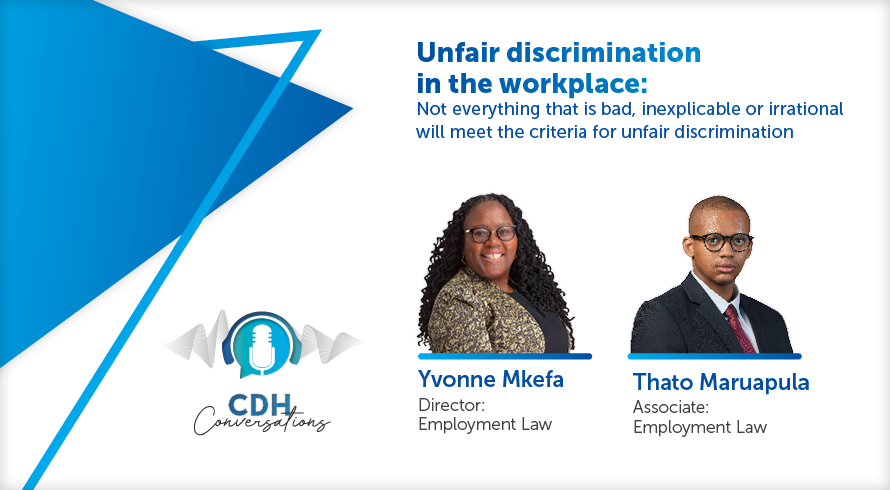Does the market sometimes not know best? Determining the “fair value” of publicly traded shares when a dissenting shareholder exercises its appraisal rights
At a glance
- South African companies often face minority shareholders exercising their appraisal rights, demanding the company to buy back their shares for "fair value" in major corporate actions.
- The definition of "fair value" is not clearly defined in the Companies Act, leading to court interpretation. In the case of BNS Nominees (RF) v Zeder Investment Limited, the court ruled that fair value is not necessarily the market value but requires a value judgment based on various factors.
- Determining fair value depends on the circumstances, including the trading price before the resolution, history behind the resolution, expert opinions, and other relevant circumstances. Valuation methodologies can vary, but the discounted cash flow (DCF) method is commonly used in foreign jurisdictions like Delaware. Companies should seek guidance from professional advisors when making offers to dissenting shareholders.
The appraisal remedy is available to dissenting shareholders who vote against (i) the entering into of a merger or scheme of arrangement, or the sale of all or a greater part of a company’s assets or undertaking; or (ii) amendments to a company’s Memorandum of Incorporation that alter the preferences, rights, limitations or other terms of any class of shares which will have a materially adverse effect on the rights or interests of the holders of that class of shares. There are certain strict, procedural steps that a dissenting shareholder needs to follow to duly exercise their rights, which we have discussed previously.
Where a dissenting shareholder has duly exercised their appraisal rights, a company is, within a prescribed period, required to make a formal written offer to acquire the shares held by the dissenting shareholder for an amount considered by the company’s directors to be the fair value of the relevant shares, determined as at the date on which, and time immediately before, the applicable resolution of shareholders that triggers the availability of the appraisal remedy is adopted.
Fair value versus market value
In the context of shares traded on a free and open market, the question of whether the fair value of a share is not simply the market value thereof often arises. As the Companies Act offers no guidance in respect of determining fair value, this has been left to the courts to decide, and the recent case of BNS Nominees (RF) (Proprietary) Limited and Another v Zeder Investment Limited and Others (Zeder) has finally provided some guidance in this regard.
In Zeder, the court held that “fair value” refers to “what the shares are actually worth” and should not be equated to the market value of the shares in question. “Whilst the JSE listed price might be a good indicator of what the shares are worth, it is not the only relevant indicator”, the court held, pointing to the fact that the Companies Act does not contain a “market-out” exception – a proviso to appraisal rights in certain US states, which, with varying specifics, denies shareholders of publicly traded companies the appraisal remedy in circumstances where similarly-situated private company shareholders would be entitled to such remedy. Rather, section 164 requires the exercise of a value judgement in determining fair value, which takes all relevant circumstances into account, the court in Zeder held, including:
- the trading price of the shares immediately prior to the adoption of the applicable resolution;
- the history behind the adoption of the aforementioned resolution;
- the opinions regarding the value of the shares expressed by relevant expert(s) engaged by the parties and / or an appraiser appointed by the court; and
- any other circumstances which the court might find to be relevant given the facts of the matter at hand.
Thus, while the traded market price of a listed share is a very significant consideration and will, in our view, generally be the primary reference point in considering what the fair value is – particularly where the stock market is liquid and reliable at the time of the applicable vote – it is not dispositive of the question.
No one-size-fits-all approach
How, then, should a board determine what the fair value of its company’s shares is? The court in Zeder found that “a wide range of possible valuation methodologies exist, and different methodologies may yield differing results ... Moreover, a valuation methodology which is appropriate in one case may not be appropriate in another”. There is thus not a one-size-fits-all approach to determining fair value, and what is appropriate will depend on the nature of the business in question, amongst other relevant facts and circumstances peculiar to the valuation at hand.
Although the court in Zeder has not, at this juncture (pending the report of an independent court-appointed appraiser), expressed a view on which valuation methodology is the most suitable in the circumstances of that case, which involves an investment holding company, it indicated a willingness to be guided by the approach followed in foreign jurisdictions. In Delaware in the US, which has the most richly developed jurisprudence on determining the fair value of shares, the discounted cash flow (DCF) method is most frequently used by the courts. It is not, however, the only valuation technique used, and the choice of methodology is usually dictated by the nature of the business in question and/or the context of the sale.
Accordingly, while Zeder has provided companies with a useful conceptual framework to reference when faced with having to make an offer to a dissenting shareholder that has duly exercised its appraisal rights, it is evident that what constitutes fair value for purposes of such an offer will turn on the facts and circumstances in question. Issuers are therefore well advised to seek guidance from their professional advisors when faced with making such an offer.
The information and material published on this website is provided for general purposes only and does not constitute legal advice. We make every effort to ensure that the content is updated regularly and to offer the most current and accurate information. Please consult one of our lawyers on any specific legal problem or matter. We accept no responsibility for any loss or damage, whether direct or consequential, which may arise from reliance on the information contained in these pages. Please refer to our full terms and conditions. Copyright © 2026 Cliffe Dekker Hofmeyr. All rights reserved. For permission to reproduce an article or publication, please contact us cliffedekkerhofmeyr@cdhlegal.com.
Subscribe
We support our clients’ strategic and operational needs by offering innovative, integrated and high quality thought leadership. To stay up to date on the latest legal developments that may potentially impact your business, subscribe to our alerts, seminar and webinar invitations.
Subscribe




